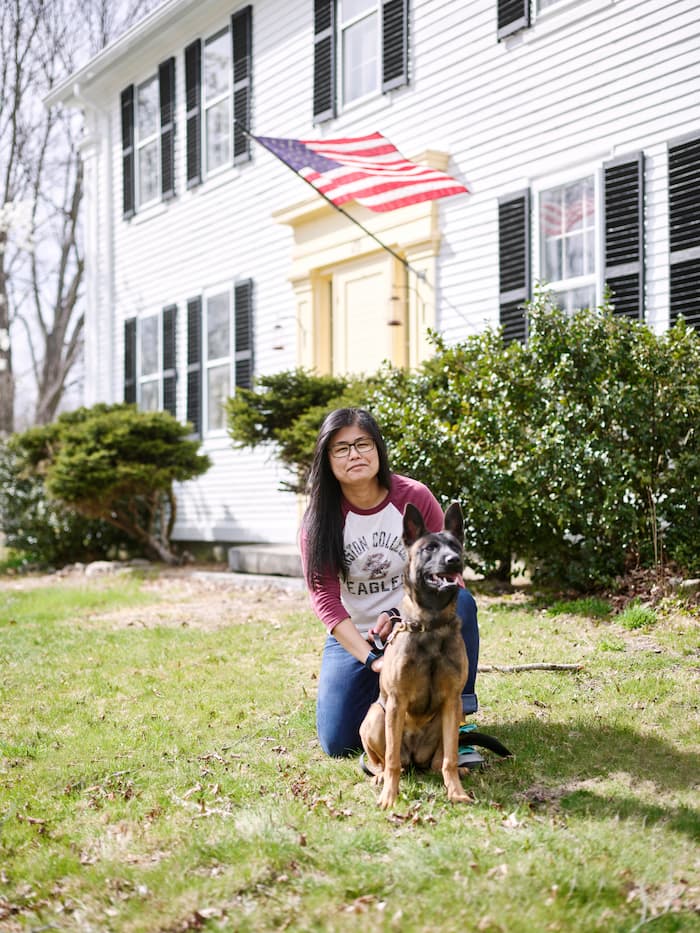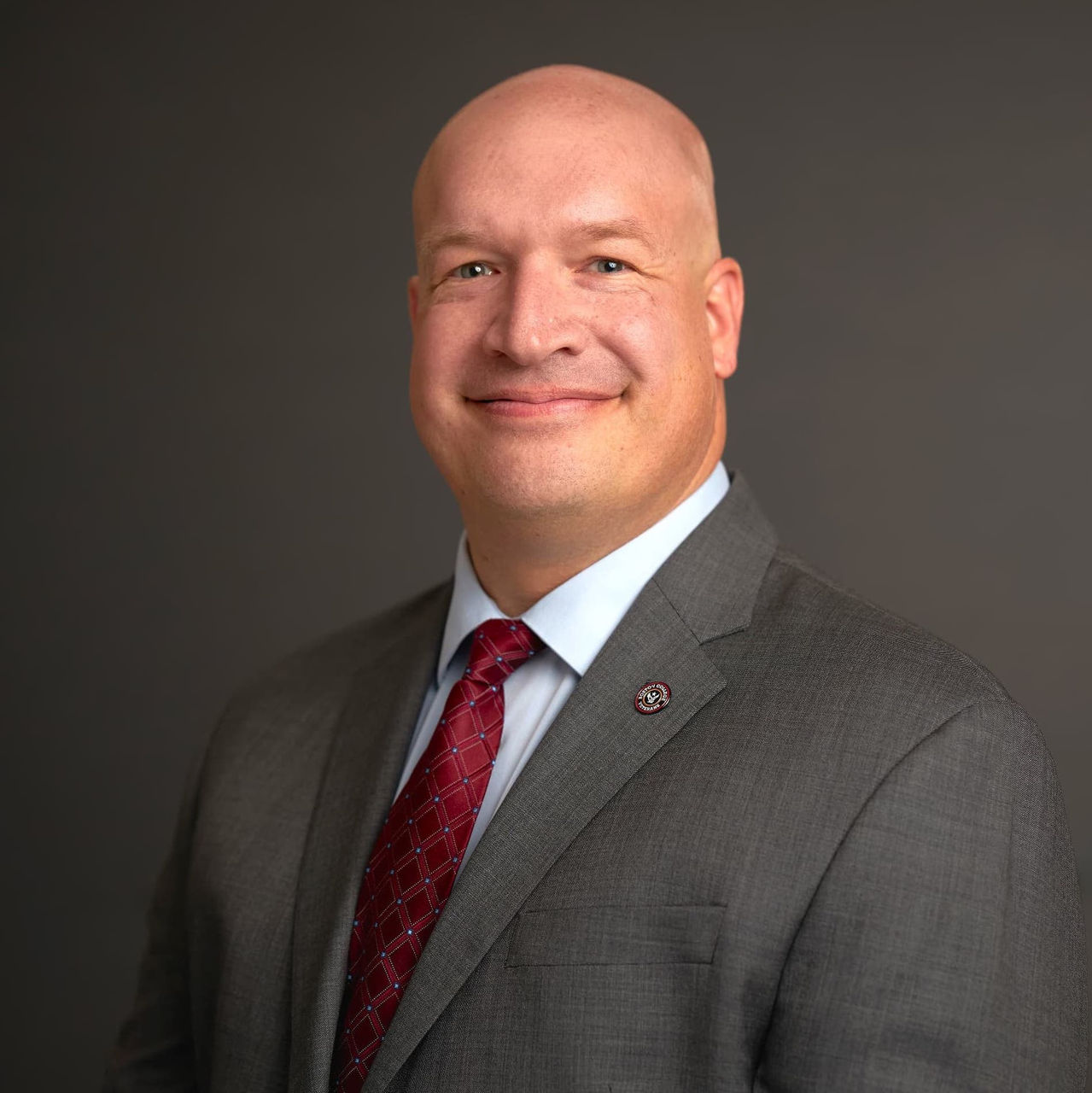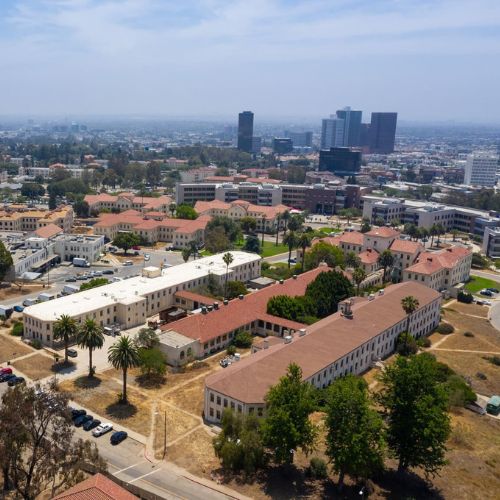Originally published in Carroll Capital, the print publication of the Carroll School of Management at Boston College. Read the full issue here.
On a Saturday in mid-November, Boston College football fans were getting into the pre-game spirit around campus. As they tossed footballs and grabbed hot dogs from their grills, Carolyn Ballinger, MBA ’25, stood by the Boston College Veterans tent with her own tailgating accessory: puppies. Unlike the boisterous Eagles fans, the puppies were calm while droves of students and alumni stopped by to meet them.
In 2022, Ballinger and her husband started Northern Pines Canines, a farm in New Hampshire that ethically breeds and trains dogs to fulfill the needs of the military special operations and law enforcement communities. The tailgate was a priceless training environment for these future working dogs, but Ballinger says it was also a step toward achieving her goal of giving back to the veteran community as an entrepreneur.

Carolyn Ballinger MBA '25
“Opportunities like bringing the dogs to campus are a remarkable reaffirmation that I made the right choice in community and program,” says Ballinger. After 17 years of active service in the Marine Corps and Navy, she entered the classroom last fall as a full-time MBA student to learn how to best run her company. While the knowledge she has gained within the classroom so far has been integral, she adds that it’s the support she’s felt from the University as a whole that has shown her the real value of a Boston College education.
For some veterans, pursuing an MBA can be a practical way to translate their military experience into the civilian workforce, but the advantages go beyond opportunities for professional development. “Quite a few veterans choose to go back to school after leaving the service,” Ballinger says. “It can be a way of giving yourself time to reassimilate into normal, everyday American life as opposed to knowing your life may be in danger nonstop.”
The difficulty of this transition, however, can be shocking. Evan Nelson, MBA ’25, left for Marine Officer Candidates School just days after receiving his undergraduate degree in 2019. By the time he was 23 years old, he had quickly risen within the ranks and was managing more than 30 people as a platoon commander and officer in charge. After leaving the service in 2023, he came to Boston College hoping to maintain similar levels of responsibility in a civilian workplace.
Nelson expected the challenge of navigating the unfamiliar MBA curriculum, but while steering through accounting exams and group projects, he had to relearn how to be a part of the civilian community as well. “There are a lot of communication barriers that you don’t even realize you have until you get out. There are customs, courtesies, and traditions that you get used to,” he says. “It is a conscious, mental effort to readjust.”
Student veterans at Boston College don’t have to endure this transition alone. With a substantial community on campus—150 veterans were enrolled in Fall 2023, including 45 MBA students—the University has made a conscious effort to meet the needs of these students. Since 2021, Mike Lorenz has been the assistant director for military and veteran support, working exclusively to ensure that all veterans on campus feel seen. “I think it’s easy for veterans to feel lost, especially when you go from the military to higher education,” says Lorenz, an Air Force veteran. “It’s my job to help them find community here and get the resources they need.”

Mike Lorenz
Lorenz’s role spans from assisting with routine paperwork for financial programs to working with departments across campus to ensure veterans’ needs are considered. He also facilitates veteran social events on campus, including helping Ballinger coordinate the logistics of bringing her dogs to the tailgate last fall. “The greatest ability of my job is that I can give veterans personal attention,” Lorenz says.
This attention to individualized needs made a big difference in Colleen Rezabek’s decision to pursue an MBA at the Carroll School. Rezabek, MBA ’25, recalls that during one of her admission interviews, her student interviewer, a second-year MBA candidate, was also a veteran. “It put me in my comfort zone because it made me feel like BC got it,” says Rezabek, who previously served as the HR officer for a US Army expeditionary military intelligence battalion. “It made me confident that they understood how my experiences can translate to what I am learning in the classroom.”
Boston College has a long history with the veteran community, with more than 3,000 alumni veterans. “Even Ignatius was a veteran,” Lorenz points out, referring to St. Ignatius Loyola, founder of the Jesuits. While raising awareness of this tradition, Boston College has also expanded the resources available to students who have served.
“Quite a few veterans choose to go back to school after leaving the service. It can be a way of giving yourself time to reassimilate into normal, everyday American life as opposed to knowing your life may be in danger nonstop. ”
The basic aid for qualifying veterans is through the Post-9/11 GI Bill, but the program only covers expenses at the in-state rate of public institutions. For that reason, the University joined the Yellow Ribbon Program, a partnership in which institutions of higher education can add funding and have it matched by the Department of Veterans Affairs. Boston College has continued to increase its support through Yellow Ribbon, now covering the full costs of tuition for those enrolled in full-time MBA, BC Law, and graduate social work programs, as one way of encouraging veterans to apply to those programs.
For students like Ballinger, who hopes to continue carving her own path as a business owner, or those like Nelson and Rezabek, who want to build upon their military experiences to pursue careers in management, an MBA from the Carroll School is invaluable. But Marilyn Eckelman, the Carroll School’s associate dean of graduate programs, says veterans are just as important to the MBA experience. “So much of an MBA education is about learning from your peers,” she says. “Veterans have seen things and experienced things that add to the classroom and community.”
“There’s a feeling of appreciation on the part of veterans, who look at their education as something they earned from their service,” says Ballinger. “You risk a lot to earn that benefit, and you can see the value that this education is going to provide.”





